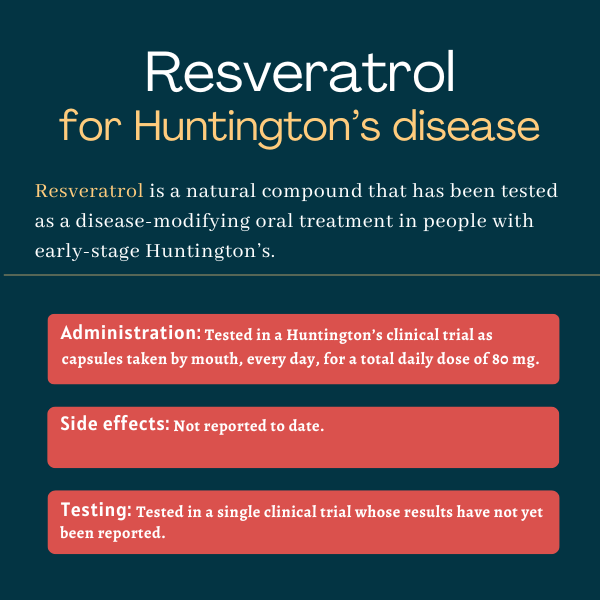Resveratrol for Huntington’s disease
Last updated Nov. 25, 2024, by Margarida Maia, PhD

What is resveratrol for Huntington’s disease?
Resveratrol is a natural compound found in certain foods that has been evaluated as a potential oral treatment to slow the progression of Huntington’s disease due to its neuroprotective properties.
Resveratrol was tested in a single clinical trial sponsored by a French hospital trust. Whether it will be evaluated in future studies is currently unclear.
Resveratrol’s therapeutic potential has also been evaluated in several other conditions, including neurodegenerative diseases such as Alzheimer’s and Friedreich’s ataxia.
Therapy snapshot
| Treatment name: | Resveratrol |
| Administration: | Tested in Huntington’s in the form of oral capsules |
| Clinical testing: | Completed a clinical trial; future plans are uncertain |
How does resveratrol work in Huntington’s disease?
Huntington’s is caused by gene mutations that result in the production of an unusually long version of a protein called huntingtin. The elongated protein is cut into smaller, toxic fragments that build up to toxic levels in nerve cells.
Over time, the resulting neurodegeneration leads to a range of motor and nonmotor symptoms that gradually worsen.
Resveratrol is a natural molecule found in certain foods, such as grapes, berries, peanuts, tea, and wine, and available in the form of dietary oral supplements. Its antioxidant and anti-inflammatory properties are thought to promote neuroprotection, which increased interest in its potential use for treating neurodegenerative diseases.
But its antioxidant activity, or ability to counteract or prevent a type of cellular damage implicated in Huntington’s called oxidative stress, is believed to be the most promising property against conditions marked by neurodegeneration.
Oxidative stress occurs when harmful oxygen-containing molecules outnumber helpful antioxidants, causing damage to cells. Excessive production of these harmful molecules can result from problems in mitochondria, the cell’s powerhouses, and several mitochondrial abnormalities have been reported in Huntington’s. Mitochondrial deficiencies can also affect the brain’s ability to make energy, and people with Huntington’s show a deficient energetic profile.
Together all these processes are thought to contribute to Huntington’s-associated neurodegeneration.
Resveratrol directly counteracts oxidative stress by scavenging excess harmful oxygen-containing molecules. The molecule is also known to activate sirtuin 1 (SIRT1), a protein that promotes the production of antioxidant enzymes, suppresses pro-inflammatory molecules, and helps preserve mitochondrial function in part by increasing mitophagy, a process whereby damaged mitochondria are broken down.
As such, this natural compound is expected to help nerve cells function properly and survive for longer, thereby easing Huntington’s symptoms and potentially slowing disease progression.
In a mouse model of Huntington’s, resveratrol was shown to improve motor coordination and learning.
How will resveratrol be administered in Huntington’s disease?
In a single clinical trial in Huntington’s, resveratrol was taken by mouth in the form of capsules — two in the morning and two in the evening — for a total dose of 80 mg per day.
Resveratrol in Huntington’s disease clinical trials
The Greater Paris University Hospitals sponsored a clinical trial, called REVHD (NCT02336633), to investigate the safety and efficacy of resveratrol in Huntington’s patients.
A total of 120 adults with early-stage Huntington’s were enrolled at the Institut du Cerveau-Paris Brain Institute, in France. Participants were randomly assigned to take oral capsules of either resveratrol (20 mg) or a placebo for up to 12 months. Two capsules were taken in the morning and two in the evening, totaling a daily dose of 80 mg for those assigned to resveratrol.
The study’s main goal was to assess changes in the rate of shrinkage, or atrophy, of the caudate nucleus, a part of the brain that is strongly affected by Huntington’s, after one year through brain MRI scans. The caudate nucleus is involved in motor control and processing of information.
Secondary goals included changes in measures of overall disease severity, functional capacity, cognitive impairment, and psychiatric problems such as anxiety and depression, as well as in the brain’s energetic profile. The therapy’s pharmacological properties and safety profile were also assessed.
The REVHD trial was concluded in early 2020, but results have not been posted to date.

Common side effects of resveratrol
Given that results of the single resveratrol trial in Huntington’s have not been published to date, its side effect profile in this patient population remains unknown.
Huntington’s Disease News is strictly a news and information website about the disease. It does not provide medical advice, diagnosis or treatment. This content is not intended to be a substitute for professional medical advice, diagnosis, or treatment. Always seek the advice of your physician or other qualified health provider with any questions you may have regarding a medical condition. Never disregard professional medical advice or delay in seeking it because of something you have read on this website.
Recent Posts
- Childhood trauma affects adult children in Huntington’s families
- Like the Hulk, my wife sometimes struggles to hold it together
- What I want medical students to know about Huntington’s and bias
- Ingrezza treatment eases disease burden due to Huntington’s chorea
- A murder trial opened my eyes about Huntington’s and face reading
- What I want people to stop saying about Huntington’s disease
- HDSA 2025: Dance classes may improve balance in Huntington’s
- HDSA 2025: Long-term care transition requires communication
- Guest Voice: Huntington’s disease is rare, but love isn’t
- HDSA 2025: Observational studies in Huntington’s now enrolling in US
Related articles




